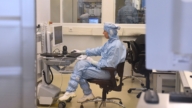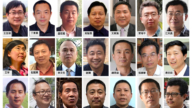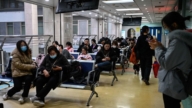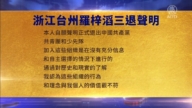【新唐人2013年11月23日讯】中共三中全会后,继所谓的《中共中央关于全面深化改革若干重大问题的决定》后,11月21号,中共最高法院又发布了《关于建立健全防范刑事冤假错案工作机制的意见》。专家指出,司法本来就应该独立于政党之外,这种响应党的会议指导,发出的“决定”和“意见”本身就没有法律效力,也只不过是一纸空文。
11月21号,中共最高法院发布《关于建立健全防范刑事冤假错案工作机制的意见》,这项《意见》共分27条,除了前五条提出了一些抽像原则外,还提出22点具体要求。
《意见》重申在司法审判中应当放弃刑讯逼供的做法,并在有限程度上对法院上下级关系做出调整,要求下级法院不得就事实和证据问题请示上级法院。
《意见》说是为了依法准确惩治犯罪,尊重和保障人权,实现司法公正,对法院建立健全防范刑事冤假错案的工作机制提出的意见。
北京宪政学者陈永苗:“最高法在政治上它是个跟屁虫,中央要它说什么,他就说什么,需要它维稳,它也把扰乱公共秩序扩大到网络上,废除了劳教,它也想在政治上表现一下,所以发一个空头文件,其实它说什么都没有用。”
大陆律师杨学林:“我们国家《意见》多如牛毛,但是,是不是下面能执行?不准刑讯逼供,那法律上都说得非常明确,刑事法上都明文规定。”
《意见》声称:只有被告人供述,没有其他证据,不能认定被告人有罪。包括要求采用刑讯逼供。或者冻、饿、晒、烤、疲劳审讯等非法方法收集的被告人供述,应当排除。
陈永苗:“中共它本身把好话说得更好的同时,然后把坏事做的更坏的,社会矛盾恐怕严重得不得了的时候,它才做一下,发这样的文件一定是冤假错案多的不得了了。”
事实上,中共所谓重审不准刑讯逼供的决定已经出台过很多次,但刑讯逼供却依然猖獗,因刑讯逼供造成一案两凶的现象也屡见不鲜。
2010年5月30号,中共最高法院、最高检察院、公安部等部门联合发布所谓的规定声称,刑讯逼供等非法手段取得的证据,不能作为定案根据。第二天,媒体还发表“禁止刑讯逼供是国家的人权承诺”的社评。
不过,去年4月,江西乐平谋杀案真凶方林崽,在大庭广众面前大声承认自己是谋杀案的真凶,却立即被警察摀住嘴带走,而已被刑讯逼供冤判死缓的四名被告,他们的家属却上访无门。今年10月30号,方林崽在法庭上坦承谋杀案是他干的,并质问司法机关“为什么不查?”可是,那几名被冤判者照旧还在服刑。
《意见》中,还要求各级法院不能以上访、闹访和地方“维稳”等压力,作出违反法律的裁判。
杨学林:“如果你审判是公平的谁还去上访,正因为我们的法院有的时候不能独立审判,才导致公民没有办法了才去上访。”
大陆网络作家荆楚:“当局为了维稳判了很多冤案,或者判了很多假案,对这个稳定压倒一切,有所反思吧,但是它强调在所谓的党领导下,永远没有司法的独立可言,没有公正办案的社会条件。”
早在2011年,刑事诉讼法再次大修改,禁止刑讯逼供,讨论“排除刑讯逼供证据”,“不强迫自证其罪”时,就有人提出对贪官不能手下留情。评论质疑,中共高院的这个《意见》,是否可能成为贪腐高官可利用的保护伞。
美国“纽约城市大学”政治学教授夏明指出,中共三中全会的一切所谓改革,都是在中共最高层的核心成员黑箱操作下完成,所谓受益的广大民众并没有参与,一切考虑的都是出于保党,以及他们自己的利益,对于大众而言只能是画饼充饥。
采访编辑/刘惠 后制/舒灿
Supreme Court Follows Third Plenary Reforms, Issues Opinions on Judiciary
On November 21, the Supreme Court issued
a reform opinion to establish sound working
mechanisms to prevent miscarriages of justice.
This follows the Third Plenary announcements
on comprehensively deepening reforms.
Experts point out that the judiciary is supposed
to be independent from political parties.
Decisions and opinions in response to party meetings
have no legal standing, and become a empty words.
On November 21, the Chinese Communist Party
(CCP) Supreme Court issued a reform opinion.
It suggests establishing sound working mechanisms to
prevent miscarriages of justice, and contains 27 entries.
In addition to the first five abstract principles,
it also raises 22 specific requirements.
It reaffirmed the need to abolish use of
confession under torture in judicial trials.
It requests the need to adjust and limit relationships
in terms of ranking, so that the lower court can’t consult
superior courts on any facts and evidence issues.
It calls for the accurate punishment of crimes,
and of respecting and protecting human rights,
as well as ensuring fairness in judicial processes.
Chen Yongmiao, Beijing constitutional scholar:
“The Supreme Court is just a copycat of CCP politics.
It will say whatever the CCP wants it to say.
The CCP needs it to safeguard stability, and it also
expanded stabilizing public order on the internet.
After the CCP’s abolition of re-education
through forced labor, it also wanted to show
it’s reform actions, issuing a vain document."
In fact, it says everything in vain.
Yang Xuelin, Mainland lawyer: “There’s countless opinions
in our country. However, can they really be accomplished?
Criminal law already made it very
clear that torture isn’t allowed."
The reform opinion states that an accused
man is not guilty if there is only his confession
used, without any other evidence present.
Confessions attained by interrogation, torture, exposure,
starvation, or other illegal methods should be excluded.
Chen Yongmiao: “At the same time that the CCP
continues to improve how it expresses good things,
it continues to commit ever worsening acts.
The CCP has to do something when
there is a very serious social conflict.
There is an incredible amount of injustice, as well as false
and erroneous cases, making them issue such a document."
In fact, banning torture during trial processes
has been introduced many times by the CCP.
But torture is still rampant, to the extent that a case becomes
that of two murders, of the first victim, and then the defendant.
On May 30, 2010, the Supreme Court, Supreme
People’s Procuratorate, Ministry of Public Security
and other departments jointly issued regulations.
It claimed that the final decision can’t be made by
evidence obtained under torture or other illegal means.
The next day, media also published an editorial about
it’s human rights promise on forbidding torture.
Fang Linzai publicly admitted that he was the real
criminal in the Jiangxi Leping murder case last April.
Fang was immediately taken away
by the police, who covered his mouth.
However the relatives of four defendants who
were charged had nowhere to appeal and petition.
On October 30, Fang Linzai admitted that he
had committed the murder, and so questioned
the judiciary why they did not investigate this?
However, several persons were sentenced,
and injustice was still served as per usual.
The reform opinion also requested that all levels of court
should avoid making illegal judgements under the excuse
of pressure from petitioners, or maintaining stability.
Yang Xuelin: “Who will petition if the judgment is fair.
Citizens have no solution other than petitioning,
when the court can’t make an independent judgment."
Jing Chu, indepednent web-writer: The authorities made a
lot of illegal decisions or false cases, to maintain stability.
When re-thinking is obsessed with stability,
we have no independent and impartial judiciary
under the so-called leadership of the party.
Back in 2011, the Criminal Procedure Code
was revised, and it prohibited torture.
At the time, the point was raised not to hide corrupt
officials when discussing banning evidence obtained
under torture and not using forced self-incrimination.
It was questioned whether the reform opinions of the
Supreme Court will become an umbrella for corrupt officials.
Politics expert Xia Ming points out that all the
so-called reforms from the Third Plenary Session
are completely black-box operated by core members.
The public, the so-called beneficiary, didn’t participate.
It’s seems more to feed an illusion for the public, because
the protection of the party, as well as protecting core
members’ own interests, are only what is considered.
Interview & Edit/LiuHui Post-Production/ShuCan

























